初中英语冠词用法总结归纳(最新整理)
- 格式:pdf
- 大小:171.97 KB
- 文档页数:5
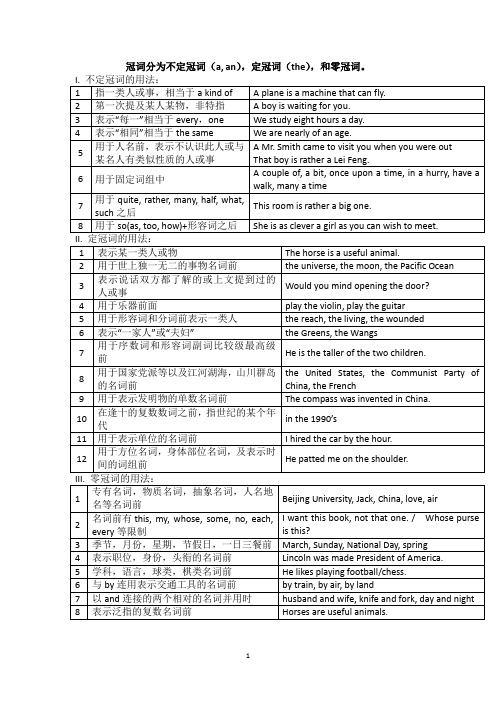
冠词分为不定冠词(a, an),定冠词(the),和零冠词。
填空There is _______ picture of _______ elephant on _______ wall.2.This is _______ useful book.I've read it for _______ hour.3._______ elephant is much heavier than _______ horse.4._______ doctor told him to take _______ medicine three times _______ day.5.Let's go out for _______ walk.6.It's too hot.Open _______ door,please.7.There is _______ woman over there._______ woman is Meimei's mother.8._______ sun rises in _______ east.9._______ Changjiang River is _______ longest river in _______ China.10.Are you going to do it _______ second time?11.Washington is _______ capital of _______ USA.12._______ Turners are living at the end of _______ Turner Street.13.He joined the army in _______ spring of _______ 1995.14._______ old man is _______ teacher.He likes playing _______ basketball after_______ supper.15.After I had _______ quick breakfast,I hurried to school.16.Are _______ sheep kept by _______ farmers for producing _______ wool and_______ meat?17.They went to _______ People's Park,but we both went to _______ People's Cinema yesterday.18.I often watch _______ TV in _______ evening.19._______ day of _______ December 20,1999 is Monday.20.Tomorrow is _______ Christmas Day and my father and I went tochoose _______ Christmas tree today.21.I think _______ maths is more important than any other subject.22.He often goes to _______ school by _______ bike.23.What does this _______ word mean,_______ Father?24.What _______ important news!选择填空1.—Does Jim have _______ ruler?—Yes,he has _______ .A.an;some B.a;one C.a;/D.any;one2.There is _______ old bike._______ old bike is Mr Zhao's.A.an ;The B.the;An C.a;The D.the;The3._______ apple a day keeps the doctors aw ay.A.The B.A C.An D.Two4.—How many books do you have?—I have _______ book.That's _______ English book.A.a;an B.a;one C.one;an D.one;one5.At that time Tom was _______ one-year-old baby.A.a B.an C.the D./6._______ tiger is _______ China.A.The;a B.A;the C.The;from D.The;the7.We can't see _______ sun at _______ night.A.the;the B.the;/C.a;/D./;/8._______ useful book it is!A.What an B.How a C.What a D.What9.One afternoon he found _______ handbag.There was _______ “s”on the corner of_______ handbag.A.a;an;the B.a;a;the C.an;an;an D.the;a;a10._______ old lady with white hair spoke _______ English well at _______ meeting.A.An;an;a B.The;/;an C.The;/;a D.The;/;the11._______ Great Wall is _______ longest wall in the world.A.A;a B.The;the C.A;the D.The;a12._______ new bridge has been built over Huangpu River.A.The;a B.A;/C.A;the D.An;the13._______ woman over there is _______ popular teacher in our school.A.A;an B.The;a C.The;the D.A;the14.He used to be _______ teacher but later he turned _______ writer.A.a;a B.a;the C./;a D.a;/15.They made him _______ king.A.a B.the C.an D./16.His father is _______ English teacher.He works in our school.A.a B.an C.the D./17.Is he _______ American boy ?A.an B.a C.one D./18.Does Tom often play _______ football after _______ school?A./;/B./;the C.the;/D.a;/19.They passed our school _______ day before yesterday.A.an B.one C.a D.the20.Australia is _______ English-speaking country.A.a B.an C.the D./21.She has _______ orange skirt._______ skirt is nice.A.a;The B.an;The C.an;A D.the;The22.This is _______ apple.It's _______ big apple.A.an;a B.a;the C.a;an D.an;the23.Look at _______ horse over there.A.a B.an C.the D./24.Don't play _______ basketball here.It's dangerous.A.a B.an C./D.the25.There is _______ old woman in the car.A./B.the C.a D.an26.Beijing is _______ beautiful city.It's _______ capital of China.A.a;a B.the;the C./;the D.a;the27.Shanghai is in _______ east of China.A./B.an C.a D.the28.I've been a student there for nearly two and _______ half years.A.a B.an C.the D./29.Bill is _______ English teacher.He likes playing _______ football.A.a;the B.an;the C.a;/D.an;/30.The museum is quite far.It will take you half _______ hour to get there by_______ bus.A.an;/B.an;a C.a;/D./;/I.1.a;an;the 2.a;an。

冠词的用法总结冠词是英语中常用的一类词汇,用于限定名词的范围和特定性。
准确使用冠词能够使句子更加准确简洁。
本文将总结冠词的用法,并提供一些例句来帮助读者理解。
一、定冠词(the)定冠词“the”用于特指特定的人、事物或概念。
具体用法如下:1. 特指已被提及过或双方都清楚的人或事物:- I saw a cat in the garden. The cat was black.(我在花园里看到了一只猫。
那只猫是黑色的。
)2. 特指独一无二的事物或类别:- The sun rises in the east.(太阳从东方升起。
)3. 特指某类人或事物中的个别成员:- The rose is a beautiful flower.(玫瑰是一种美丽的花。
)二、不定冠词(a/an)不定冠词“a”和“an”用于泛指某个人或事物,不具体特定。
具体用法如下:1. 泛指单数可数名词:- I saw a dog in the park.(我在公园里看到了一只狗。
)2. 泛指以辅音音素开头的单数可数名词时使用"a",泛指以元音音素开头的单数可数名词时使用"an":- He is an honest man.(他是个诚实的人。
)3. 表示数量、速度或比例:- A kilogram equals 1000 grams.(一千克等于一千克。
)三、零冠词有一些情况下,名词前不需要使用冠词,称为零冠词(zero article)。
具体用法如下:1. 泛指抽象名词、物质名词和复数名词:- Love is a wonderful feeling.(爱是一种美好的感觉。
)2. 用于专有名词、国家、语言、球类运动等:- I am learning Chinese.(我正在学汉语。
)- They play basketball every Saturday.(他们每个星期六打篮球。
)四、特殊用法除了常见的定冠词和不定冠词,还有一些特殊的冠词用法需要注意:1. 序数词和形容词最高级前常用定冠词:- He is the first person to arrive.(他是第一个到达的人。

2024中考英语冠词知识点总结_0
冠词是英语中的一个重要语法项目,分为不定冠词(a, an)和定冠词(the)。
以下是2024中考英语冠词知识点总结:
1. 不定冠词a和an:
- a用在以辅音音素开头的单数可数名词前,an用在以元音音素开头的单数可数名词前。
- a和an在表示职业、宗教、国籍等的名词前表示"一个"。
- a / an + 形容词 + 单数可数名词表示一类人或事物。
2. 定冠词the:
- 表特指的人或事物,前面是限定词(如one, this, that)或不定代词(如some, any)。
-表示上文已提到或上下文所指的人或事物。
-表示独一无二的事物、习惯用语、乐器、剧、团体等。
-用于序数词、形容词最高级和形容词所有格前。
3.不用冠词的情况:
-泛指一类人或事物时。
-用于具有全球性、普遍性的名词前。
-用在表示餐次、学科、节日、球类、运动等名词前。
-用于不可数名词、复数名词以及名词作非谓语动词时。
4.冠词用法的特殊情况:
- 表示上面提到的一类人或事物时,用a / an表示"一个"。
- 与不定代词some, any, each, every和numeral连用时,不需要冠词。
- 在固定短语中,如by bus, in bed, at school等,不需要冠词。
总的来说,正确使用冠词需要根据名词的性质、上下文和习惯用法来决定。
掌握冠词的用法能够帮助我们准确表达和理解英语句子的意思。
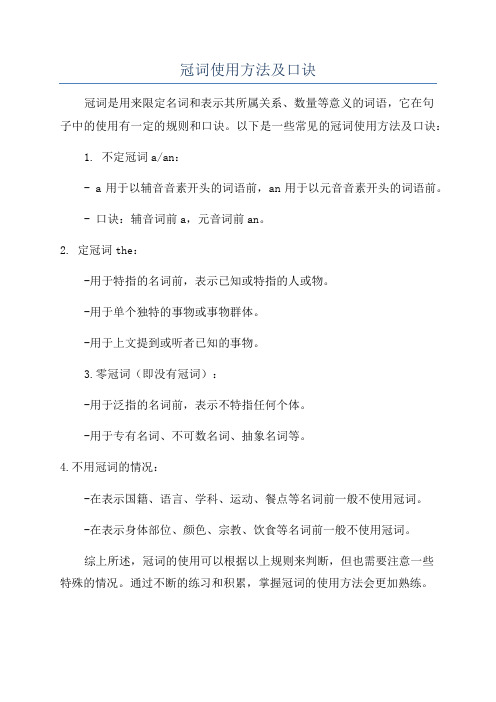
冠词使用方法及口诀
冠词是用来限定名词和表示其所属关系、数量等意义的词语,它在句
子中的使用有一定的规则和口诀。
以下是一些常见的冠词使用方法及口诀:
1. 不定冠词a/an:
- a用于以辅音音素开头的词语前,an用于以元音音素开头的词语前。
- 口诀:辅音词前a,元音词前an。
2. 定冠词the:
-用于特指的名词前,表示已知或特指的人或物。
-用于单个独特的事物或事物群体。
-用于上文提到或听者已知的事物。
3.零冠词(即没有冠词):
-用于泛指的名词前,表示不特指任何个体。
-用于专有名词、不可数名词、抽象名词等。
4.不用冠词的情况:
-在表示国籍、语言、学科、运动、餐点等名词前一般不使用冠词。
-在表示身体部位、颜色、宗教、饮食等名词前一般不使用冠词。
综上所述,冠词的使用可以根据以上规则来判断,但也需要注意一些
特殊的情况。
通过不断的练习和积累,掌握冠词的使用方法会更加熟练。
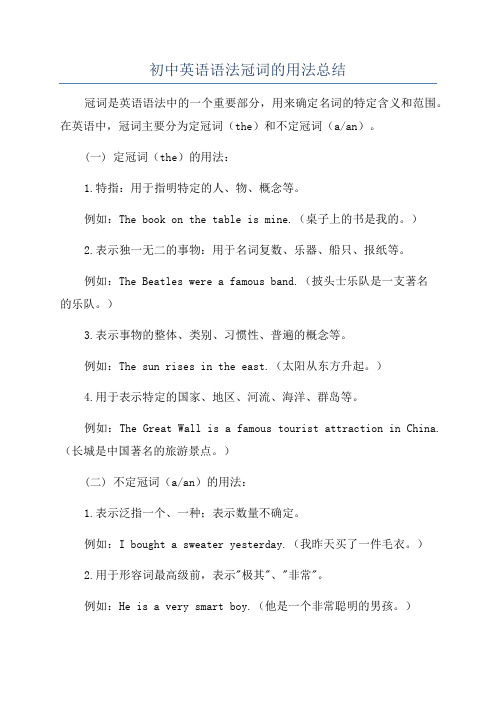
初中英语语法冠词的用法总结冠词是英语语法中的一个重要部分,用来确定名词的特定含义和范围。
在英语中,冠词主要分为定冠词(the)和不定冠词(a/an)。
(一) 定冠词(the)的用法:1.特指:用于指明特定的人、物、概念等。
例如:The book on the table is mine.(桌子上的书是我的。
)2.表示独一无二的事物:用于名词复数、乐器、船只、报纸等。
例如:The Beatles were a famous band.(披头士乐队是一支著名的乐队。
)3.表示事物的整体、类别、习惯性、普遍的概念等。
例如:The sun rises in the east.(太阳从东方升起。
)4.用于表示特定的国家、地区、河流、海洋、群岛等。
例如:The Great Wall is a famous tourist attraction in China.(长城是中国著名的旅游景点。
)(二) 不定冠词(a/an)的用法:1.表示泛指一个、一种;表示数量不确定。
例如:I bought a sweater yesterday.(我昨天买了一件毛衣。
)2.用于形容词最高级前,表示"极其"、"非常"。
例如:He is a very smart boy.(他是一个非常聪明的男孩。
)3.用于职业、宗教、身份、国籍等名词前,表示其中一种身份。
例如:He is an engineer.(他是一名工程师。
)不定冠词的变化规则:a.在以辅音音素开头的单词前使用"a"。
例如:a book(一本书)b. 在以元音音素开头的单词前使用"an"。
例如:an apple(一个苹果)c. 在以元音音素的发音开头的辅音音素前使用"an"。
例如:an hour(一个小时)在特定情况下,定冠词和不定冠词可以被省略:1.当名词表示泛指和抽象概念时。

冠词的用法【概念引入】冠词是一种虚词,它置于名词前,帮助说明名词的含义。
冠词本身不能单独使用,在句子中不重读。
冠词可以分为不定冠词和定冠词。
此外,在某些情况下是不使用冠词的,这种不使用冠词的情况叫做零冠词。
【用法讲解】1. 不定冠词的用法:不定冠词包括a/an,只用于单数可数名词前。
a用于以辅音音素开头的单词前,an用于以元音音素开头的单词前。
它们的意思相当于one, 但是不像one一样强调数量。
不定冠词在很多情况下可以译成“一”、“每”,有时可以不译出。
例如:There is a book on the table. 桌子上有一本书。
Please give me an apple. 请给我一个苹果。
不定冠词的具体用法包括以下几个方面:1)表示一类人或者一类事物中的一个。
例如:He’s an English teacher.他是个英语老师。
It’s an action movie. 这是一部动作片。
2)指某人或某物,但不具体说明是何人或何物。
例如:A girl is waiting for you at the school gate.一个女孩在校门口等你。
Is there a bank near here? 这附近有银行吗?3)用在时间、速度、价格等前,表示“每一”,相当于every。
例如:-How much are the oranges? 桔子多少钱?-Two yuan a kilo.每公斤两元。
I go to school five days a week.我一周上五天课。
4)用在某一些固定搭配的短语中。
例如:a lot of许多 a little/ a few 一点after a while 一会儿have a look 看一看have a good time 玩得高兴have a cold 感冒5)用在序数词前,表示“又一”,“再一”。
例如,I have three books. I want to buy a fourth one.我已经有三本书,我想买第四本。
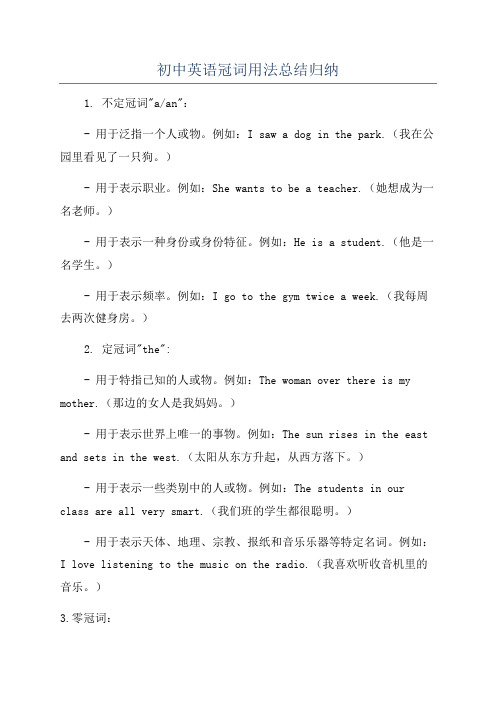
初中英语冠词用法总结归纳1. 不定冠词"a/an":- 用于泛指一个人或物。
例如:I saw a dog in the park.(我在公园里看见了一只狗。
)- 用于表示职业。
例如:She wants to be a teacher.(她想成为一名老师。
)- 用于表示一种身份或身份特征。
例如:He is a student.(他是一名学生。
)- 用于表示频率。
例如:I go to the gym twice a week.(我每周去两次健身房。
)2. 定冠词"the":- 用于特指已知的人或物。
例如:The woman over there is my mother.(那边的女人是我妈妈。
)- 用于表示世界上唯一的事物。
例如:The sun rises in the east and sets in the west.(太阳从东方升起,从西方落下。
)- 用于表示一些类别中的人或物。
例如:The students in our class are all very smart.(我们班的学生都很聪明。
)- 用于表示天体、地理、宗教、报纸和音乐乐器等特定名词。
例如:I love listening to the music on the radio.(我喜欢听收音机里的音乐。
)3.零冠词:- 用于表示特定场所或表示活动的名词。
例如:We went to school.(我们去学校了。
- 用于表示一般化的概念。
例如:Water is essential for life.(水对生命来说是必不可少的。
)- 用于表示语言学科、学位、节日、饮食等专有名词。
例如:I study English.(我学习英语。
)需要注意的是,有些名词可以用不定冠词"a/an"或定冠词"the",具体的用法要根据上下文来判断。
另外,对于可数名词,还要注意单复数形式的冠词用法。
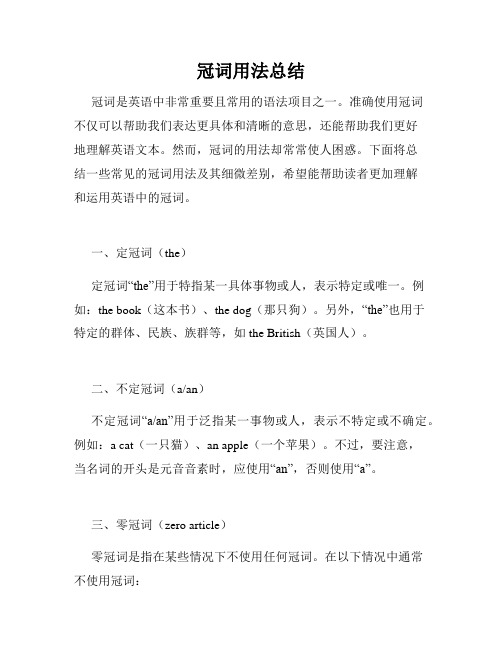
冠词用法总结冠词是英语中非常重要且常用的语法项目之一。
准确使用冠词不仅可以帮助我们表达更具体和清晰的意思,还能帮助我们更好地理解英语文本。
然而,冠词的用法却常常使人困惑。
下面将总结一些常见的冠词用法及其细微差别,希望能帮助读者更加理解和运用英语中的冠词。
一、定冠词(the)定冠词“the”用于特指某一具体事物或人,表示特定或唯一。
例如:the book(这本书)、the dog(那只狗)。
另外,“the”也用于特定的群体、民族、族群等,如the British(英国人)。
二、不定冠词(a/an)不定冠词“a/an”用于泛指某一事物或人,表示不特定或不确定。
例如:a cat(一只猫)、an apple(一个苹果)。
不过,要注意,当名词的开头是元音音素时,应使用“an”,否则使用“a”。
三、零冠词(zero article)零冠词是指在某些情况下不使用任何冠词。
在以下情况中通常不使用冠词:1.泛指名词复数:Birds can fly.(鸟可以飞翔。
)2.泛指的抽象名词:Love is blind.(爱情是盲目的。
)3.独特名词:London is the capital of England.(伦敦是英格兰的首都。
)四、特殊用法除了以上常见用法外,冠词还有一些特殊用法需要我们关注。
1. 用于序数词和形容词最高级前:He won the first prize.(他赢得了第一名。
)2. 用于乐器前,表示弹奏乐器:She plays the piano.(她弹钢琴。
)3. 用于姓氏复数前,表示整个家族:The Smiths are coming.(史密斯一家要来了。
)4. 用于特定名词前,表示类别:I love the cinema.(我喜欢电影院。
)5. 用于某些短语中:in the morning(在早上)、on the way(在路上)等。
五、错误用法常见问题虽然冠词的用法看起来简单,但是有时候却容易出错。

初中英语冠词用法总结归纳及综合练习一、不定冠词1.不定冠词a,anA用于以辅音因素或半元音因素/j/,/w/开头的单词。
An用于元音因素开头的单词注意:元音因素开头的单词,首字母不一定就是元音字母例如,hour,honest等单词,看起来是以辅音字母开头,但是发音时辅音字母h没有发音,而是以元音开头,因此前面应加不定冠词an。
而有些单词如university,uniform等单词,是以元音字母u开头,但是读音时u发半元音/j/开头,所以前面应加a。
2.不定冠词的用法。
(1)用于可数名词的单数前,表示数量“一”,如:I have a new pen.(2)表示一类人或物,如:An elephant is big and strong.(3)第一次提到的人或物,如:Look, a dog is running to us.(4)表示“每一”的意思,如:I go shopping once a week.3.不定冠词的固定搭配have a look 看一下 have a good time 玩得愉快take a break 休息一下 take a walk 散步in a hurry 急匆匆地 half an hour 半小时a lot of 许多,大量 a great deal of 大量 +不可数名词a number of 许多 +可数名词 a few 一些 +可数名词a little 一些 +不可数名词二、定冠词1.定冠词the的用法(1)特指某些人或物,例如:The woman in red dress is my mother.(2)特指前面提到过的人或物,例如:I have a dog. The dog is cute.(3)指谈话双方都知道的人或事物。
What do you think of the novel?(4)指宇宙间独一无二的东西,如:The moon is bright at night.(5)用于单数名词前表示一类人或物,如:The horse is a useful animal.(6)用于序数词前,如:、January is the first month of the year.(7)用于形容词的最高级前面,如:John is the tallest student in my class.(8)用于方位和位置前,如:At the top of at the back of at the bottom of at the middle of(9)用于某些专有名词前,如:the Yangtze River the Great Wallthe United Nations the Summer Palace(10)用于姓氏复数前,表示一家人,如:The Wangs are having dinner now。
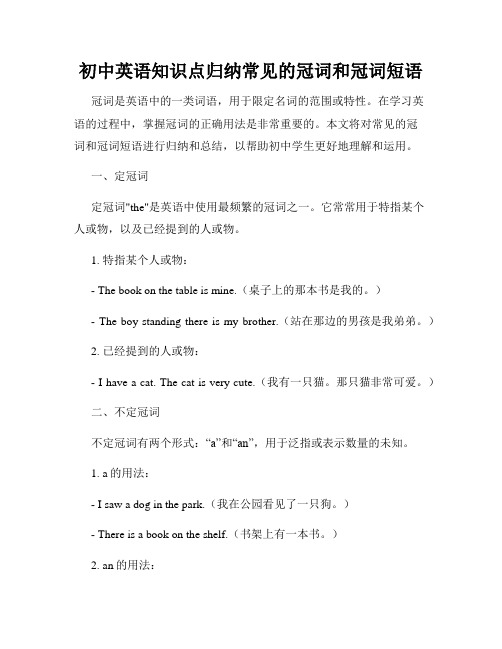
初中英语知识点归纳常见的冠词和冠词短语冠词是英语中的一类词语,用于限定名词的范围或特性。
在学习英语的过程中,掌握冠词的正确用法是非常重要的。
本文将对常见的冠词和冠词短语进行归纳和总结,以帮助初中学生更好地理解和运用。
一、定冠词定冠词"the"是英语中使用最频繁的冠词之一。
它常常用于特指某个人或物,以及已经提到的人或物。
1. 特指某个人或物:- The book on the table is mine.(桌子上的那本书是我的。
)- The boy standing there is my brother.(站在那边的男孩是我弟弟。
)2. 已经提到的人或物:- I have a cat. The cat is very cute.(我有一只猫。
那只猫非常可爱。
)二、不定冠词不定冠词有两个形式:“a”和“an”,用于泛指或表示数量的未知。
1. a的用法:- I saw a dog in the park.(我在公园看见了一只狗。
)- There is a book on the shelf.(书架上有一本书。
)2. an的用法:- There is an apple on the table.(桌子上有一个苹果。
)- She is an English teacher.(她是一名英语教师。
)三、零冠词零冠词即指名词前无冠词的情况,常出现在一些特殊的语境中。
1. 专有名词:- Peter is a student.(彼得是个学生。
)- London is a beautiful city.(伦敦是个美丽的城市。
)2. 表示广义概念:- Water is essential for life.(水对生命很重要。
)- Sugar is bad for your health.(糖对健康不好。
)四、冠词短语除了单个的冠词外,还有一些常用的冠词短语需要掌握。
1. all the:- I have read all the books on the shelf.(我已经读过书架上的所有书了。
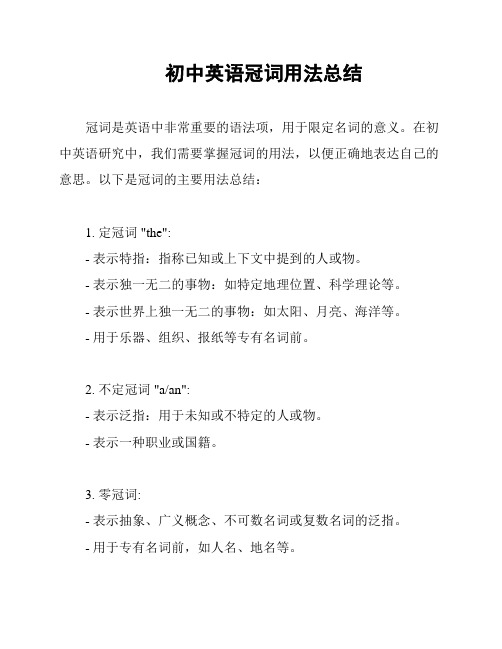
初中英语冠词用法总结
冠词是英语中非常重要的语法项,用于限定名词的意义。
在初中英语研究中,我们需要掌握冠词的用法,以便正确地表达自己的意思。
以下是冠词的主要用法总结:
1. 定冠词 "the":
- 表示特指:指称已知或上下文中提到的人或物。
- 表示独一无二的事物:如特定地理位置、科学理论等。
- 表示世界上独一无二的事物:如太阳、月亮、海洋等。
- 用于乐器、组织、报纸等专有名词前。
2. 不定冠词 "a/an":
- 表示泛指:用于未知或不特定的人或物。
- 表示一种职业或国籍。
3. 零冠词:
- 表示抽象、广义概念、不可数名词或复数名词的泛指。
- 用于专有名词前,如人名、地名等。
4. 冠词的注意事项:
- 冠词前通常不用于人名、地名、语言名称等特定名词。
- 用于序数词或形容词最高级前,表示“第一”、“最好的”。
- 用于有些语、固定搭配中,如"at school"、"by day"、"in general"等。
总结以上内容,冠词在英语中起到了非常重要的作用,正确使用冠词可以让我们的表达更准确、更自然。
在研究过程中,我们应该多加练和积累,提高冠词的正确运用能力。
以上就是初中英语冠词用法总结。
(总字数:186)。
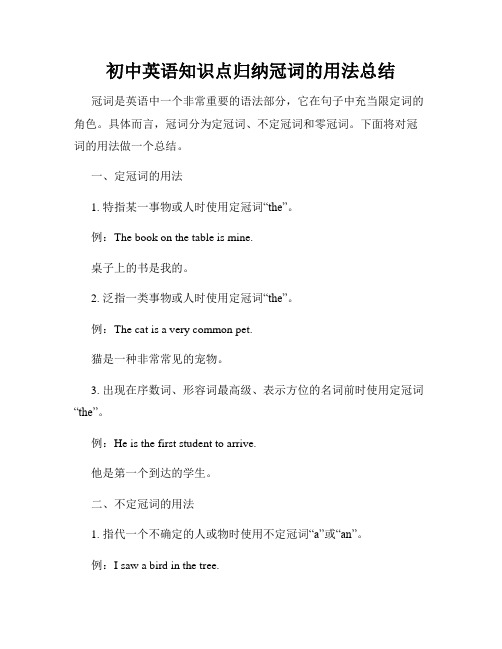
初中英语知识点归纳冠词的用法总结冠词是英语中一个非常重要的语法部分,它在句子中充当限定词的角色。
具体而言,冠词分为定冠词、不定冠词和零冠词。
下面将对冠词的用法做一个总结。
一、定冠词的用法1. 特指某一事物或人时使用定冠词“the”。
例:The book on the table is mine.桌子上的书是我的。
2. 泛指一类事物或人时使用定冠词“the”。
例:The cat is a very common pet.猫是一种非常常见的宠物。
3. 出现在序数词、形容词最高级、表示方位的名词前时使用定冠词“the”。
例:He is the first student to arrive.他是第一个到达的学生。
二、不定冠词的用法1. 指代一个不确定的人或物时使用不定冠词“a”或“an”。
例:I saw a bird in the tree.我在树上看到了一只鸟。
2. “a”用于以辅音音素开头的单数名词前,而“an”则用于以元音音素开头的单数名词前。
例:Can you give me an apple?你能给我一个苹果吗?三、零冠词的用法1. 表示一般情况或泛指时,名词前不添加任何冠词。
例:Dogs are loyal animals.狗是忠诚的动物。
2. 在表示国家、语言、学科、球类运动、餐饮等特殊情况下,名词前也不添加冠词。
例:She is studying English.她正在学习英语。
四、冠词的特殊用法1. 表示独一无二的事物时,使用定冠词“the”。
例:The sun rises in the east.太阳从东方升起。
2. 在表示乐器、船、电影、剧集等特定事物时,使用定冠词“the”。
例:I can play the piano.我会弹钢琴。
3. 有些名词既可以是可数名词又可以是不可数名词,其前面的冠词选择则不同。
例:I want a glass of water. (不可数名词)我想要一杯水。
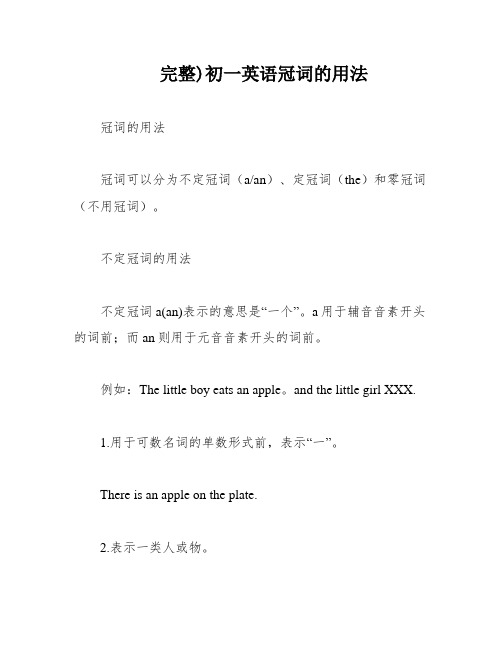
完整)初一英语冠词的用法冠词的用法冠词可以分为不定冠词(a/an)、定冠词(the)和零冠词(不用冠词)。
不定冠词的用法不定冠词a(an)表示的意思是“一个”。
a用于辅音音素开头的词前;而an则用于元音音素开头的词前。
例如:The little boy eats an apple。
and the little girl XXX.1.用于可数名词的单数形式前,表示“一”。
There is an apple on the plate.2.表示一类人或物。
A XXX XXX.3.第一次提到某人或某物。
This is an English-XXX.4.在一些固定搭配中,例如:a lot of/ a little/ a few/ a pair of/ a set of等。
定冠词的用法定冠词(the)是XXX的总称,放在名词前,表示特定的事物或人。
1.第二次提到某人或某物,用定冠词the。
Look。
There is a ball under the table。
The ball is XXX.2.用于指说话双方都知道的事物或人。
XXX?3.放在序数词前。
Monday is the second day of the week.4.放在形容词最高级前。
He is the tallest boy in our class.5.表示世上独一无二的事物。
XXX goes around the sun.6.定冠词放在姓氏复数前,表示“……一家”。
XXX XXX.7.定冠词后接单数名词表示一类人或物。
The dog is a kind of XXX.8.定冠词和形容词连用,也可以代表某类人或物。
The poor。
the bad。
the rich。
the good.9.演奏某项乐器时,乐器前需加the。
例如:play the drums/play the piano/ play the lin。
10.在一些固定搭配中。
例如:the end。
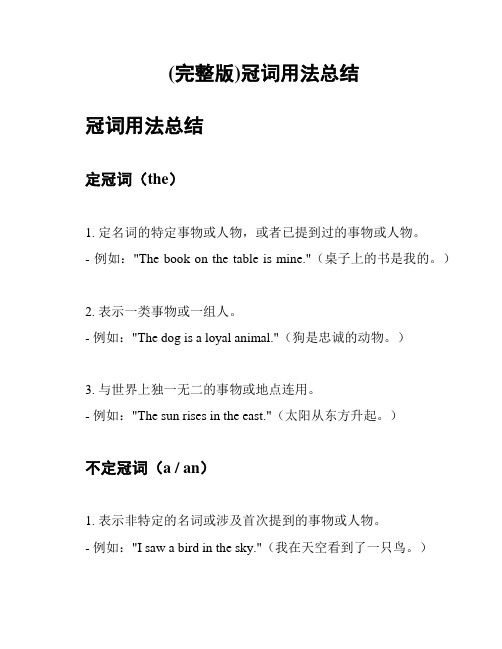
(完整版)冠词用法总结冠词用法总结定冠词(the)1. 定名词的特定事物或人物,或者已提到过的事物或人物。
- 例如:"The book on the table is mine."(桌子上的书是我的。
)2. 表示一类事物或一组人。
- 例如:"The dog is a loyal animal."(狗是忠诚的动物。
)3. 与世界上独一无二的事物或地点连用。
- 例如:"The sun rises in the east."(太阳从东方升起。
)不定冠词(a / an)1. 表示非特定的名词或涉及首次提到的事物或人物。
- 例如:"I saw a bird in the sky."(我在天空看到了一只鸟。
)2. 与某些职业连用,表示属于该职业的人。
- 例如:"She is a doctor."(她是一名医生。
)3. 用在以辅音音素开头的词前,使用 "a",用在以元音音素开头的词前,使用 "an"。
- 例如:"I ate an apple for breakfast."(我早餐吃了一个苹果。
)零冠词(no article)1. 表示泛指、抽象事物、学科、语言以及用作不可数和复数名词的表达。
- 例如:"Cars are convenient for transportation."(汽车对于交通非常方便。
)2. 与表示具体内容的词语连用,如 some, any, every, each 等。
- 例如:"I need some time to think."(我需要一些时间来思考。
)3. 与表示地点的词语连用,如 home, school, church 等。
- 例如:"She goes to school every day."(她每天去学校。
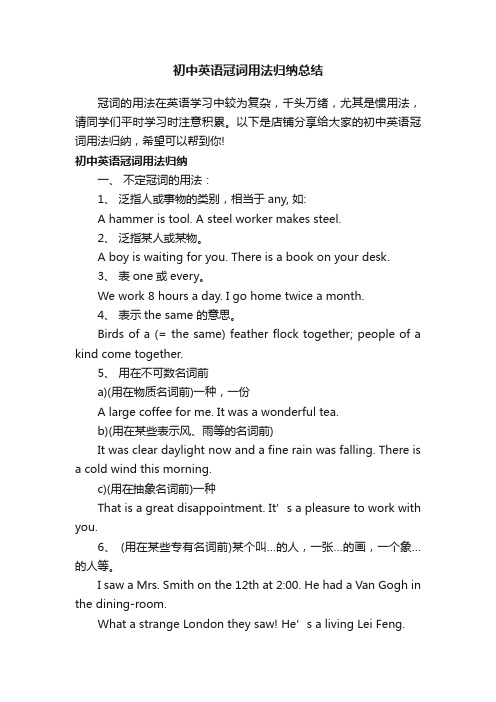
初中英语冠词用法归纳总结冠词的用法在英语学习中较为复杂,千头万绪,尤其是惯用法,请同学们平时学习时注意积累。
以下是店铺分享给大家的初中英语冠词用法归纳,希望可以帮到你!初中英语冠词用法归纳一、不定冠词的用法:1、泛指人或事物的类别,相当于any, 如:A hammer is tool. A steel worker makes steel.2、泛指某人或某物。
A boy is waiting for you. There is a book on your desk.3、表one或every。
We work 8 hours a day. I go home twice a month.4、表示the same 的意思。
Birds of a (= the same) feather flock together; people of a kind come together.5、用在不可数名词前a)(用在物质名词前)一种,一份A large coffee for me. It was a wonderful tea.b)(用在某些表示风、雨等的名词前)It was clear daylight now and a fine rain was falling. There is a cold wind this morning.c)(用在抽象名词前)一种That is a great disappointment. It’s a pleasure to work with you.6、(用在某些专有名词前)某个叫…的人,一张…的画,一个象…的人等。
I saw a Mrs. Smith on the 12th at 2:00. He had a Van Gogh in the dining-room.What a strange London they saw! He’s a living Lei Feng.7、用于某些固定词组中。
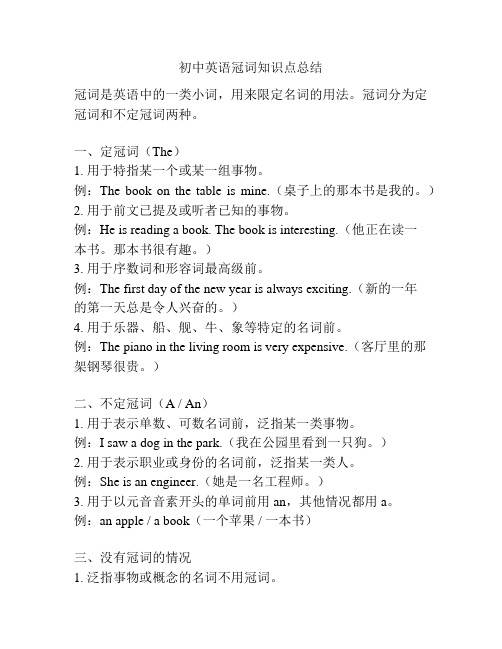
初中英语冠词知识点总结冠词是英语中的一类小词,用来限定名词的用法。
冠词分为定冠词和不定冠词两种。
一、定冠词(The)1. 用于特指某一个或某一组事物。
例:The book on the table is mine.(桌子上的那本书是我的。
)2. 用于前文已提及或听者已知的事物。
例:He is reading a book. The book is interesting.(他正在读一本书。
那本书很有趣。
)3. 用于序数词和形容词最高级前。
例:The first day of the new year is always exciting.(新的一年的第一天总是令人兴奋的。
)4. 用于乐器、船、舰、牛、象等特定的名词前。
例:The piano in the living room is very expensive.(客厅里的那架钢琴很贵。
)二、不定冠词(A / An)1. 用于表示单数、可数名词前,泛指某一类事物。
例:I saw a dog in the park.(我在公园里看到一只狗。
)2. 用于表示职业或身份的名词前,泛指某一类人。
例:She is an engineer.(她是一名工程师。
)3. 用于以元音音素开头的单词前用an,其他情况都用a。
例:an apple / a book(一个苹果 / 一本书)三、没有冠词的情况1. 泛指事物或概念的名词不用冠词。
例:Water is essential for life.(水对生命至关重要。
)2. 名词前有物主代词、名词所有格或不定代词时,可以省略冠词。
例:My brother is a doctor.(我的哥哥是医生。
)。
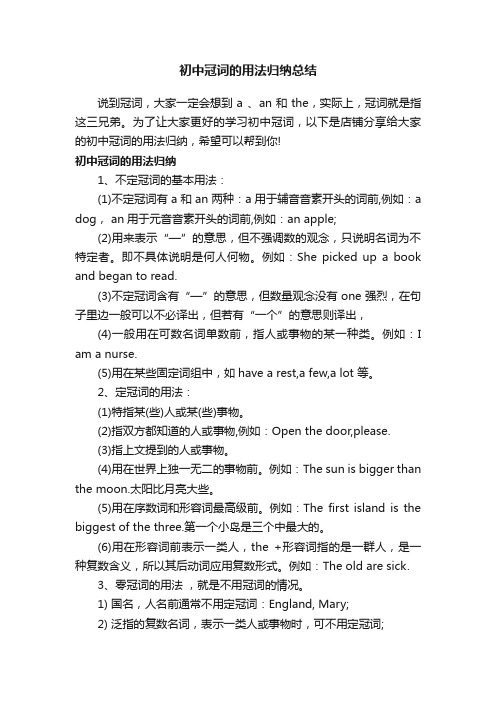
初中冠词的用法归纳总结说到冠词,大家一定会想到a 、an和the,实际上,冠词就是指这三兄弟。
为了让大家更好的学习初中冠词,以下是店铺分享给大家的初中冠词的用法归纳,希望可以帮到你!初中冠词的用法归纳1、不定冠词的基本用法:(1)不定冠词有a和an两种:a用于辅音音素开头的词前,例如:a dog, an用于元音音素开头的词前,例如:an apple;(2)用来表示“—”的意思,但不强调数的观念,只说明名词为不特定者。
即不具体说明是何人何物。
例如:She picked up a book and began to read.(3)不定冠词含有“—”的意思,但数量观念没有one强烈,在句子里边一般可以不必译出,但若有“一个”的意思则译出,(4)一般用在可数名词单数前,指人或事物的某一种类。
例如:I am a nurse.(5)用在某些固定词组中,如have a rest,a few,a lot 等。
2、定冠词的用法:(1)特指某(些)人或某(些)事物。
(2)指双方都知道的人或事物,例如:Open the door,please.(3)指上文提到的人或事物。
(4)用在世界上独一无二的事物前。
例如:The sun is bigger than the moon.太阳比月亮大些。
(5)用在序数词和形容词最高级前。
例如:The first island is the biggest of the three.第一个小岛是三个中最大的。
(6)用在形容词前表示一类人,the +形容词指的是一群人,是一种复数含义,所以其后动词应用复数形式。
例如:The old are sick.3、零冠词的用法,就是不用冠词的情况。
1) 国名,人名前通常不用定冠词:England, Mary;2) 泛指的复数名词,表示一类人或事物时,可不用定冠词;They are teachers. 他们是教师。
3) 抽象名词表示一般概念时,通常不加冠词;Failure is the mother of success. 失败乃成功之母。

七年级英语上册知识点汇总:冠词的用法七年级英语上册知识点汇总:冠词的用法一、冠词的基本概念冠词,是用来表示名词特性的一种词,它表示名词可数不可数、单数复数、任何一个还是特定的一个等.也就是说,冠词与名词是紧密连在一起的.如果用了a/an/the,不管后面是什么词,都变成了名词.所以,冠词就是放在名词前面的一种词.使用冠词有三种基本情况:1、用a/ana/an用在单数可数名词前面,表示这个人或事物是泛指的不确定的一个,相当于中文的“一个”.注意:可数的单数名词前,必须要用a/an或the.我们不能说boy,desk,dog,而必须说aboy/theboy.a用在读音为辅音开头的名词之前,而an用在读音为元音开头的名词之前.注意:这里指的是“读音”,而不仅仅指字母.例如:auniversity一所大学(虽然u是元音字母,但不读元音.)anhour一个小时(虽然h不是元音,但单词读音是元音开头)另外,a/an也可用在不可数名词前面,这时,这个不可数名词就变成了可数的单数名词,意义上也有变化.例如:glass玻璃,aglass一只玻璃杯/wood木头,awood一片树林power威力,apower大国/beauty美丽,abeauty美人,美的事物2、用thethe相当于this/that或these/those,总的用法是表示特定的人或事物.the 的用法最广,不管是可数还是不可数,不管是单数还是复数,都可以用the.具体用法见下面的讲解.3、不用冠词有的时候,名词前面不用任何冠词,没有a/an/the.有的书上称为零冠词.不可数名词前可以不用冠词,可数的复数名词也可以不用,还有一些习惯用法上不需要用.下面,详细讲一个冠词的用法.二、不定冠词的用法:1、表示某一类人或某事物中的任何一个,通常在第一次提到某人或某物时用a/an,以表示与其他事物的区别. Igavehimabookyesterday.我昨天给了他一本书. Iamreadinganinterestingstory.我在读一本有趣的故事书. Ihavegotaticket.我有一张票.Thereisatreeinfrontofmyhouse.我的屋前有一棵树.2、用其中的任何一个,代表他们所属种类的特性. Ahorseisusefultomankind.马对人类有用.Abirdcanfly.鸟会飞.Asteelworkermakessteel.炼钢工人炼钢.3、用在事物的度量单位前,如时间、速度、价格等,表示"每一个". Weoftengotoschooltwotimesaday.我们常常一天两次去学校.Iwenttothelibraryonceaweekatleast.我一星期至少去一次图书馆. Thepotatoissoldatabout30fenajin.土豆卖三毛钱一斤.4、用来泛指某人、某物或地方. Aboycametoseeyouamomentago.刚才有一个小孩来找你. Igotthistoolinashop.我在商店买的这件工具.Weneedacarnow.我们现在需要一辆车.Sheisill,shehastoseeadoctor.她病了,她得去看病.5、用于某些特定的词组.例如:afew几个,alittle有点,等等. Shehasafewfriendsinthiscity.她在这个城市中有几个朋友. Thereisalittlemilkinthebottle.瓶子里有点牛奶. Onlyafewstudentsareintheclassroom.只有几个学生在教室里.三、定冠词的用法\x091、定冠词特指某(些)人或某(些)事物.Thebaginthedeskismine.桌子里的书包是我的. Isthisthebookyouarelookingfor?这是你要找的书吗? Doyouknowthemaninback?你知道穿黑色衣服的人是谁吗? Itisnotthecarwearelookingfor.这不是我们要找的车. Themanhasfoundhischild.那个人找到了他的孩子.2、如果第一次提到某人或事物的时候,用a/an,那么以后再提到的话,就变成特指的人或事物了.IboughtabookfromXinhuabook-shop.Thebookcosts15yuan.我从新华书店买了一本书.这本书值十五元.Isawafilmyesterday.Thefilmwasendedateighto'clock.我昨天看了一场电影.电影八点钟结束的. Lucyboughtaradioyesterday,butshefoundsomethingwaswrongwiththeradio. 露西昨天买了一台收音机,但是她发现收音机有问题.3、定冠词用于表示世界上独一无二的事物或用于自然界现象或方位名词之前.这些事物当然是特指的事物,不可能有两个以上. thesunthemoontheearththeskytheworldthewinternightThesunisbiggerthanthemoon.太阳比月亮大. Icanseeabirdinthesky.我能看到天空中有一只小鸟. Iliketohaveawalkwiththebrightmoonlightintheevening.我愿晚上在明亮的月光下散步.4、定冠词与单数名词连用,也可以表示这一类人或事物.\x09 Thedogisnottoodanger.狗不太危险.Thecatisananimal.猫是一种动物. Theumbrellaintheshopisverycheapinthisseason.这个季节商店里的雨伞很便宜.5、定冠词与形容词连用,可表示某一类人或事物.这可看作是省略了名词的用法.Thewoundedwerebroughttothehospital.受伤者被送到了医院.Healwayshelpsthepoor.他经常帮助穷人. Thedeafcangotothisspecialschool.耳聋者可以进这所特殊学校上学.注意:the用在姓名复数之前,表示一家人. TheGreensisverykindtous.格林一家人待我们很好. TheWhitesliketheclassicmusic.怀特一家喜欢古典音乐.主要是定冠词和不定冠词零冠词1)国名,人名前通常不用定冠词:England,Mary;2)泛指的复数名词,表示一类人或事物时,可不用定冠词; Theyareteachers.他们是教师.3)抽象名词表示一般概念时,通常不加冠词; Failureisthemotherofsuccess.失败乃成功之母.4)物质名词表示一般概念时,通常不加冠词,当表示特定的意思时,需要加定冠词;Mancannotlivewithoutwater.人离开水就无法生存.5)在季节、月份、节日、假日、日期、星期等表示时间的名词之前,不加冠词;WegotoschoolfromMondaytoFriday.我们从星期一到星期五都上课.6)在称呼或表示官衔,职位的名词前不加冠词; TheguardstooktheAmericantoGeneralLee.士兵们把这个美国人送到李将军那里.7)在三餐、球类运动和娱乐运动的名称前,不加冠词如:havebreakfast,playchess8)当两个或两个以上名词并用时,常省去冠词;Ican'twritewithoutpenorpencil.没有钢笔和铅笔,我就写不了字.9)当by与火车等交通工具连用,表示一种方式时,中间无冠词;bybus,bytrain;10)有些个体名词不用冠词;如:school,college,prison,market,hospital,bed,table,class,town,church,court等个体名词,直接置于介词后,表示该名词的深层含义;gotohospital去医院看病gotothehospital去医院(并不是去看病,而是有其他目的)11)不用冠词的序数词;a.序数词前有物主代词b.序数词作副词Hecamefirstintherace.c.在固定词组中at(the)first,firstofall,fromfirsttolast。
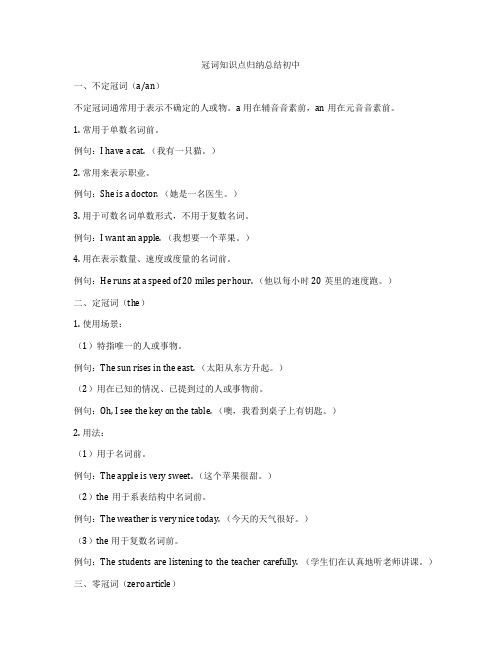
冠词知识点归纳总结初中一、不定冠词(a/an)不定冠词通常用于表示不确定的人或物。
a用在辅音音素前,an用在元音音素前。
1. 常用于单数名词前。
例句:I have a cat. (我有一只猫。
)2. 常用来表示职业。
例句:She is a doctor. (她是一名医生。
)3. 用于可数名词单数形式,不用于复数名词。
例句:I want an apple. (我想要一个苹果。
)4. 用在表示数量、速度或度量的名词前。
例句:He runs at a speed of 20 miles per hour. (他以每小时20英里的速度跑。
)二、定冠词(the)1. 使用场景:(1)特指唯一的人或事物。
例句:The sun rises in the east. (太阳从东方升起。
)(2)用在已知的情况、已提到过的人或事物前。
例句:Oh, I see the key on the table. (噢,我看到桌子上有钥匙。
)2. 用法:(1)用于名词前。
例句:The apple is very sweet. (这个苹果很甜。
)(2)the用于系表结构中名词前。
例句:The weather is very nice today. (今天的天气很好。
)(3)the 用于复数名词前。
例句:The students are listening to the teacher carefully. (学生们在认真地听老师讲课。
)三、零冠词(zero article)在以下情况下可以不用冠词:1. 名词表示一大类事物或一类人时。
如:Man is mortal.(人是有生命的。
)2. 名词表示泛指时。
如:I need help.(我需要帮助。
)3. 表示方位或时间的名词前。
如:Come to school early.(早点到学校。
)4. 后面加形容词的一些名词前。
如:He is always good to me.(他对我总是很好。

冠词冠词在句中的位置及分类:冠词主要放在名词之前,说明名词所表示的人或事物。
冠词有三种:a和an为不定冠词,the为定冠词,零冠词(名词前不用冠词)。
一、不定冠词(一)不定冠词a,an的区别a用在以辅音音素开头的单词前,an用在以元音音素开头的单词前。
如:an honest boyThere is an“f”in the word“five”.记忆:“不见元音不加an,不看字母看发音”。
1. 在26个字母中,前面用an的字母有“a, e, f, h, i, l, m, n, o, r, s,x,”,其它用a。
2. 注意区别以u开头的单词。
an umbrellaan unusual storyan unhappy boya universityauseful book(二)不定冠词的用法1、在叙述时用于第一次提到某人或某物前。
如:This is a book.2、泛指人或事物的某一类别,以区别于其他种类。
如:A plane is a machine that can fly.3、泛指某人或某物。
如:A young man is waiting for you.4、用于表示时间、速度、价格等意义的名词之前,有“每一”的意思,相当于every。
如:five lessons a week5、用在某些物质名词或抽象名词前,表示“一阵,一份,一类,一场”等。
如:There'llbe a strong wind in South China.6、用于可视为一个整体的两个名词前。
如:a knife and fork 一副刀叉7、“a+序数词”表示“又一,再一”。
如:The cake is delicious,and I would like a second one.8、表示数量,有“一个”的意思。
如:I have a pen.9、用来说明事物的同一性质、特征、程度或大小,相当于the same,表示“相同”。
冠词
1.不定冠词
1.不定冠词a,an
A用于以辅音因素或半元音因素/j/,/w/开头的单词。
An用于元音因素开头的单词
注意:元音因素开头的单词,首字母不一定就是元音字母例如,hour,honest等单词,看起来是以辅音字母开头,但是发音时辅音字母h没有发音,而是以元音开头,因此前面应加不定冠词an。
而有些单词如university,uniform等单词,是以元音字母u开头,但是读音时u发半元音/j/开头,所以前面应加a。
2.不定冠词的用法。
(1)用于可数名词的单数前,表示数量“一”,如:
I have a new pen.
(2) 表示一类人或物,如:
An elephant is big and strong.
(3) 第一次提到的人或物,如:
Look, a dog is running to us.
(4) 表示“每一”的意思,如:
I go shopping once a week.
3.不定冠词的固定搭配
have a look 看一下have a good time 玩得愉快
take a break 休息一下take a walk 散步
in a hurry 急匆匆地half an hour 半小时
a lot of 许多,大量 a great deal of 大量+不可数名词
a number of 许多+可数名词 a few 一些+可数名词
a little 一些+不可数名词
2.定冠词
1.定冠词the的用法
(1)特指某些人或物,例如:
The woman in red dress is my mother.
(2) 特指前面提到过的人或物,例如:
I have a dog. The dog is cute.
(3) 指谈话双方都知道的人或事物。
What do you think of the novel?
(4) 指宇宙间独一无二的东西,如:
The moon is bright at night.
(5) 用于单数名词前表示一类人或物,如:
The horse is a useful animal.
(6) 用于序数词前,如:、
January is the first month of the year.
(7) 用于形容词的最高级前面,如:
John is the tallest student in my class.
(8) 用于方位和位置前,如:
At the top of at the back of at the bottom of at the middle of (9) 用于某些专有名词前,如:
the Yangtze River the Great Wall
the United Nations the Summer Palace
(10) 用于姓氏复数前,表示一家人,如:
The Wangs are having dinner now。
姓王的一家人正在吃饭。
(11) 用于乐器名词前
(12) 用于一些形容词前,表示某一类人,注意后面的动词要用复数,如:the poor ,the rich,the sick,the young,the old
2.定冠词the 的固定搭配
make the bed at the beginning of
lay the table in the end
on the right/left to tell the truth
by the way in the morning/afternoon/evening go to the cinema
3.零冠词
一下几种情况不用任何冠词
1.一些专用名词,如:
China Europe
2.月份,星期几,季节前不加冠词,如:
I like summer best.
3.一日三餐前不加冠词,如:
I have dinner at home.
4.球类运动和游戏前不加冠词,如:
play football play chess play computer games 5.一些由普通名词构成的节日前不加冠词,如:National Day Christmas New Year’s Day
6.可数名词的复数前不加the,表示一类,如:
I like apples.我喜欢苹果。
Rabbits are lovely。
兔子很可爱。
7.表示交通方式或通讯方式的名词前不加冠词,如:By bus/by car on foot by e-mail by telephone
8.零冠词的固定搭配:
go to school at school go to town at night
go to bed at noon at home in hospital
“”
“”
At the end, Xiao Bian gives you a passage. Minand once said, "people who learn to learn are very happy people.". In every wonderful life, learning is an eternal theme. As a professional clerical and teaching position, I understand the importance of continuous learning, "life is diligent, nothing can be gained", only continuous learning can achieve better self. Only by constantly learning and mastering the latest relevant knowledge, can employees from all walks of life keep up with the pace of enterprise development and innovate to meet the needs of the market. This document is also edited by my studio professionals, there may be errors in the document, if there are errors, please correct, thank you!。